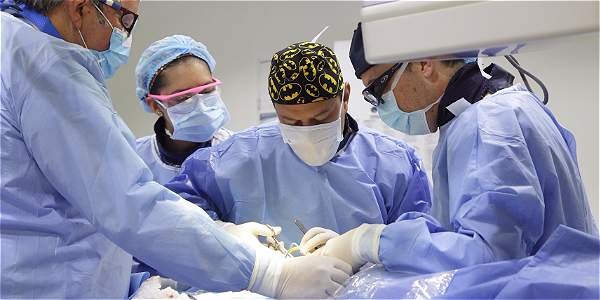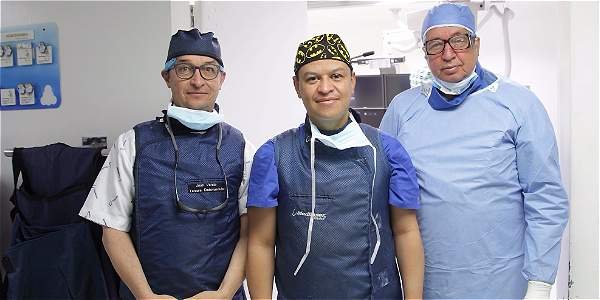Medilaser conducted vascular intervention. Benefits peasant Aquitaine.

Without a drop of pain and with only two tiny incisions on his body woke up in a room of Medilaser Clinic of Tunja Eulalia Montaña after having undergone surgery that was performed for the first time in Latin America.
Eulalia Mountain is a woman of 73, lives in Aquitaine and is dedicated to farm work, but for five years severe abdominal pain began to torment her days.
"The hospitalized and was diagnosed an aneurysm in the abdominal aorta, they said that they could not operate because of their age because it was an open surgery, so I sent her home," says Ana Rojas, one of his daughters.
Thus they passed five years in fear of death, for breaking the most important artery of the body, responsible for distributing blood throughout the body, the outcome would have been fatal.
But this week the fate of Eulalia changed; his case was in the hands of expert vascular surgeons who repaired Medilaser Clinic for the first time in the history of Latin America's most important artery of the human body, thanks to a prosthesis and a endograpa or species millimeter screw.
"She came with an aneurysm, ie a bag or larger vessel dilation that is in the body. The blood pressure within the vessel tends to enlarge to a point where you can break and lose all the blood that passes through there, "said Hector Jimenez, cardiovascular surgeon.
So the solution was to implant a stent, something like a fabric tube that is deployed within the aorta for blood to pass inside him and no longer dilate more the aneurysm, thus preventing breakage.
"This is a novel process because we do it with a small incision, sailed into the blood vessels to reach the site where the aneurysm is and we no longer open the abdomen as we did before," said the expert.
Well, this procedure has been carried out since 2006, in fact in that year, Tunja was the third largest city in practice in the same clinic, and from that time until now have not stopped saving lives.
However, scholars noted that the device located inside the aorta risked slip, because the small hooks that have to be anchored to the walls of the artery were not sufficient to maintain the fixed prosthesis.
So about five years ago was designed a device for 'screwing' prosthesis to the aorta, that is a mechanical clamp which does not allow to move or blood around the exhaust device.

In this invention capable of saving lives they called endovascular endograpa, a millimetric screws became a distant reality, because although more than 5,000 people in the United States and Europe product this effective device is saved, no country in Latin America had achieved access it. Until now.
Tunja, first to implement the 'screw'

Juan Varela, Hector Jimenez and Carlos Espinosa surgeons were doctors who perform surgery on Eulalia Mountain
Medtronic, the global company manufacturer EndoAnchor or spirals microscrews, this week launched the new product in Bogota and chose specialists Medilaser of Tunja Clinic for the first intervention of this kind.
"We have placed many stents, we are part of the group of vascular surgeons in the country places such devices, the company knows it and so had the privilege," said Hector Jimenez.
So if Eulalia was the right time to be solved with this procedure after strenuous proceedings before Share, EPS administering the subsidized regime, he endorsed the intervention that could cost more than 60 million pesos of which the patient does not pay anything .
Finally, the surgery was a success, lasted more than three hours and involved, in addition to the vascular surgeons Medilaser Hector Jimenez and Carlos Espinosa, Juan Varela, surgeon Reina Sofia Clinic of Bogota, and Vincent Riambau, professor University of Barcelona.
And the surgical procedure was performed
The aorta is the body's largest vessel, leaving the heart, carries blood to all other vessels leading to the brain, arms, liver, stomach, kidneys and lower extremities.
"Every three minutes that blood vessel passes through all the blood in the body, meaning that if it breaks, in a very short time the person may die," said Jimenez.
The aneurysm, meanwhile, is a weakness of the aortic wall, and blood pressure within the vessel is tending to widen it and turn it into a sack in some parts.
So to solve the problem, is used to repair the aorta through a edoprótesis endovascular, as it is called the procedure, which involves installing a prosthetic material, which in this case is shaped trousers, for which will circulate blood now onwards to avoid contact with the walls of the aorta.
This is done by a device (a cable tiny) that is inserted through small incisions two centimeters that are made to the patient's groin to enter the aorta.
X rays guided through the device to the site where the aneurysm is located and there prosthesis acquires its original tubular shape and adheres to the walls of the aorta is deployed.
"So the blood coming and can not enter the aneurysm, has to follow within the prosthesis," says the surgeon.
Finally, for the prosthesis in the future will not move, Screw endograpa in the neck of the prosthesis to secure it to the wall of the aorta, as if a drill pushed her into a wall.
Thus the risk of dying is reduced during open surgery and reduces the chances of complications in the future
Before starting posting you need to make an introduction post about yourself and put a link of your facebook profile or any social media profile. You need to do it before anything because steemit needed to verify your identity to know you are what you claim you are.
Very neat article. How many centimeters of dilation? I'm a senior medical student and recently diagnosed a AAA during a physical exam. This individual was obese, but I could see the aorta pulsating without even having to feel it. Keep up the good work, Doc!